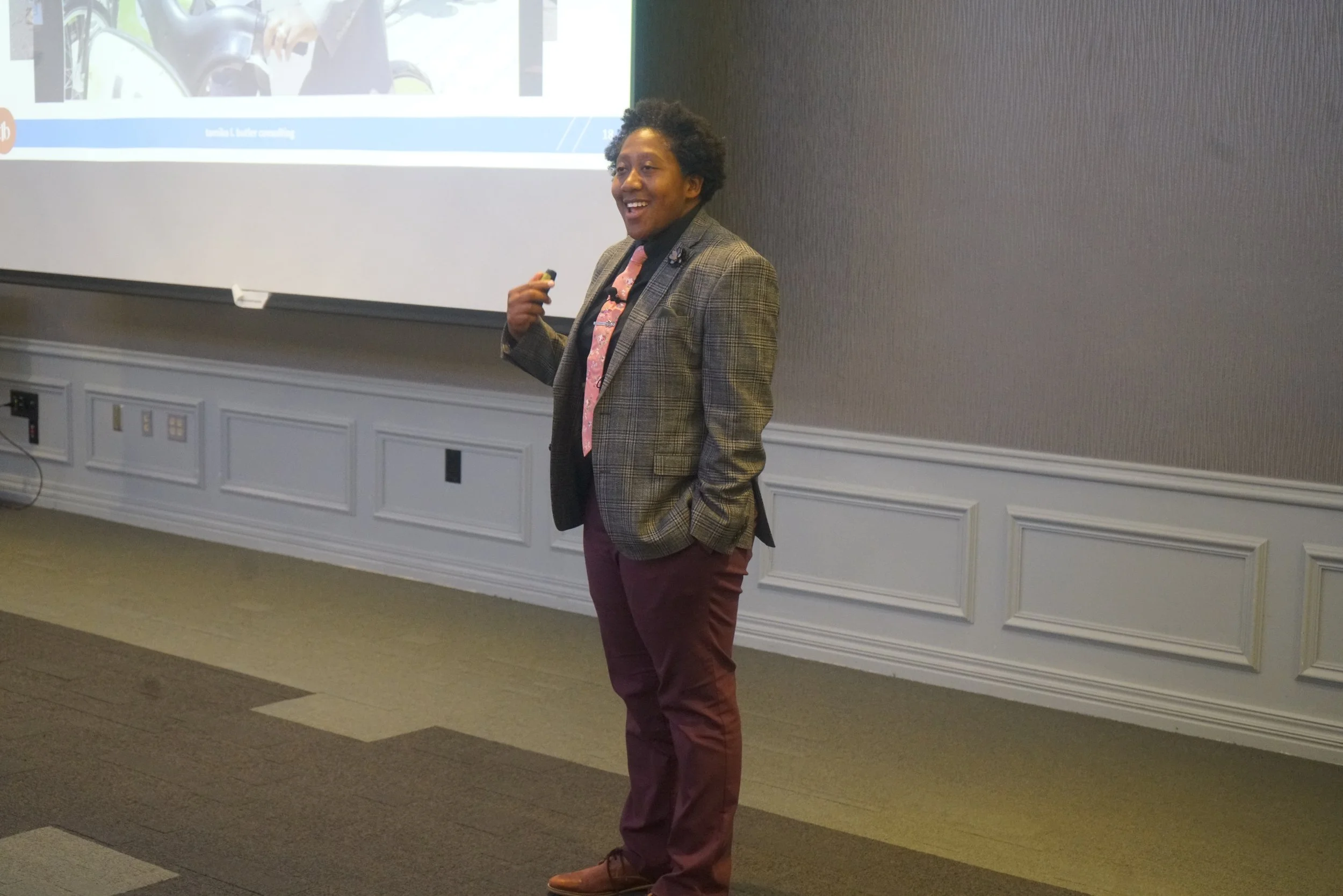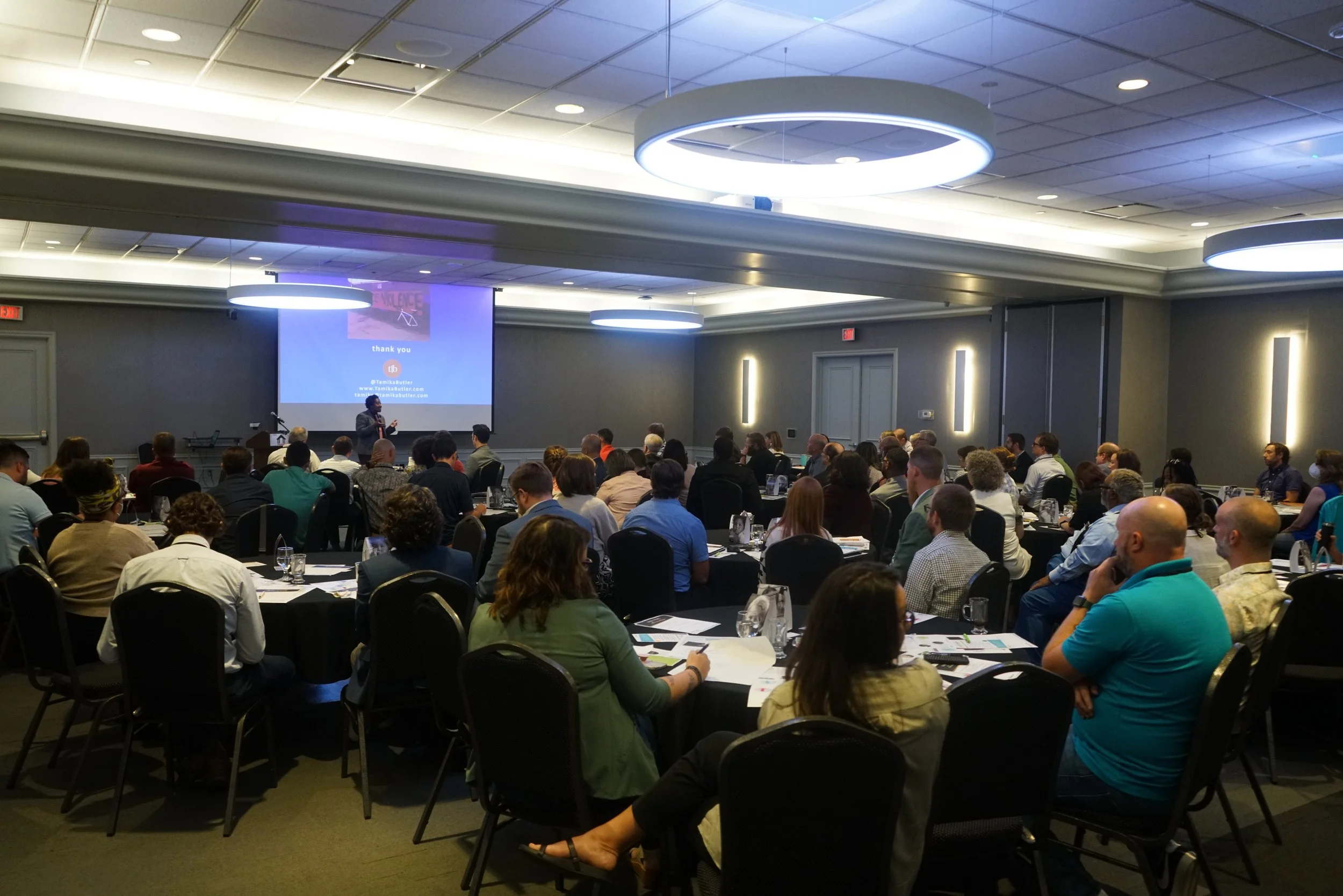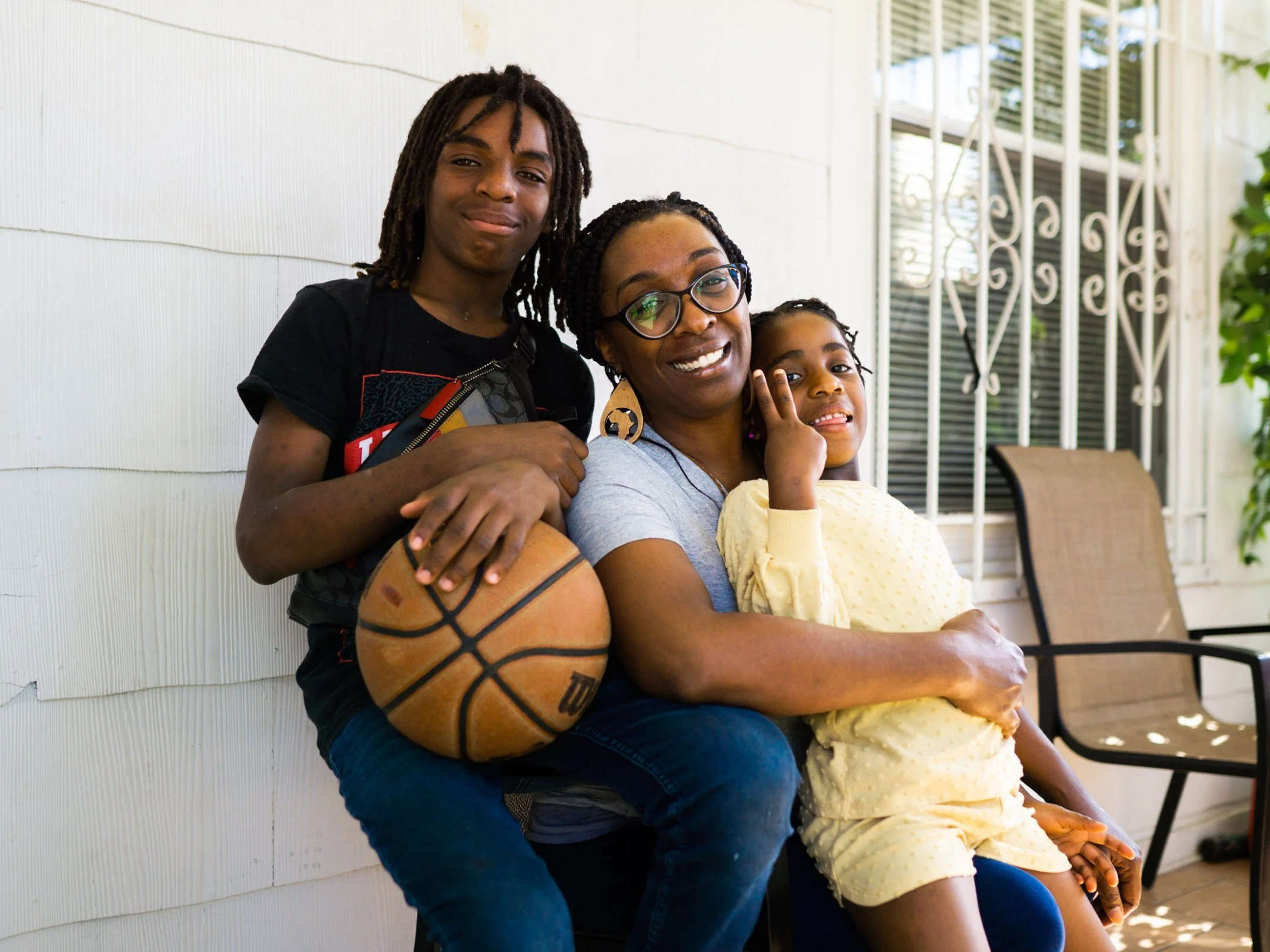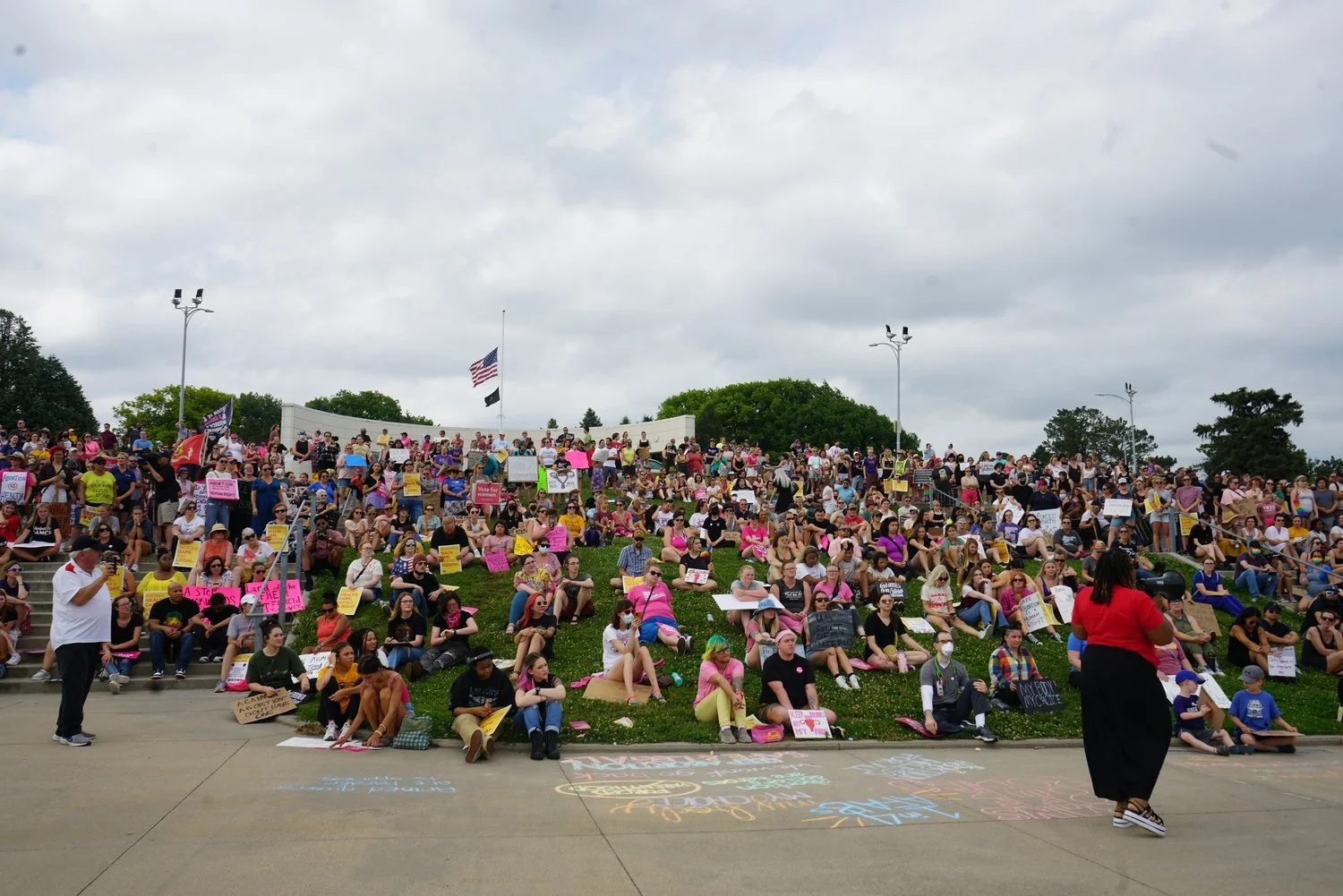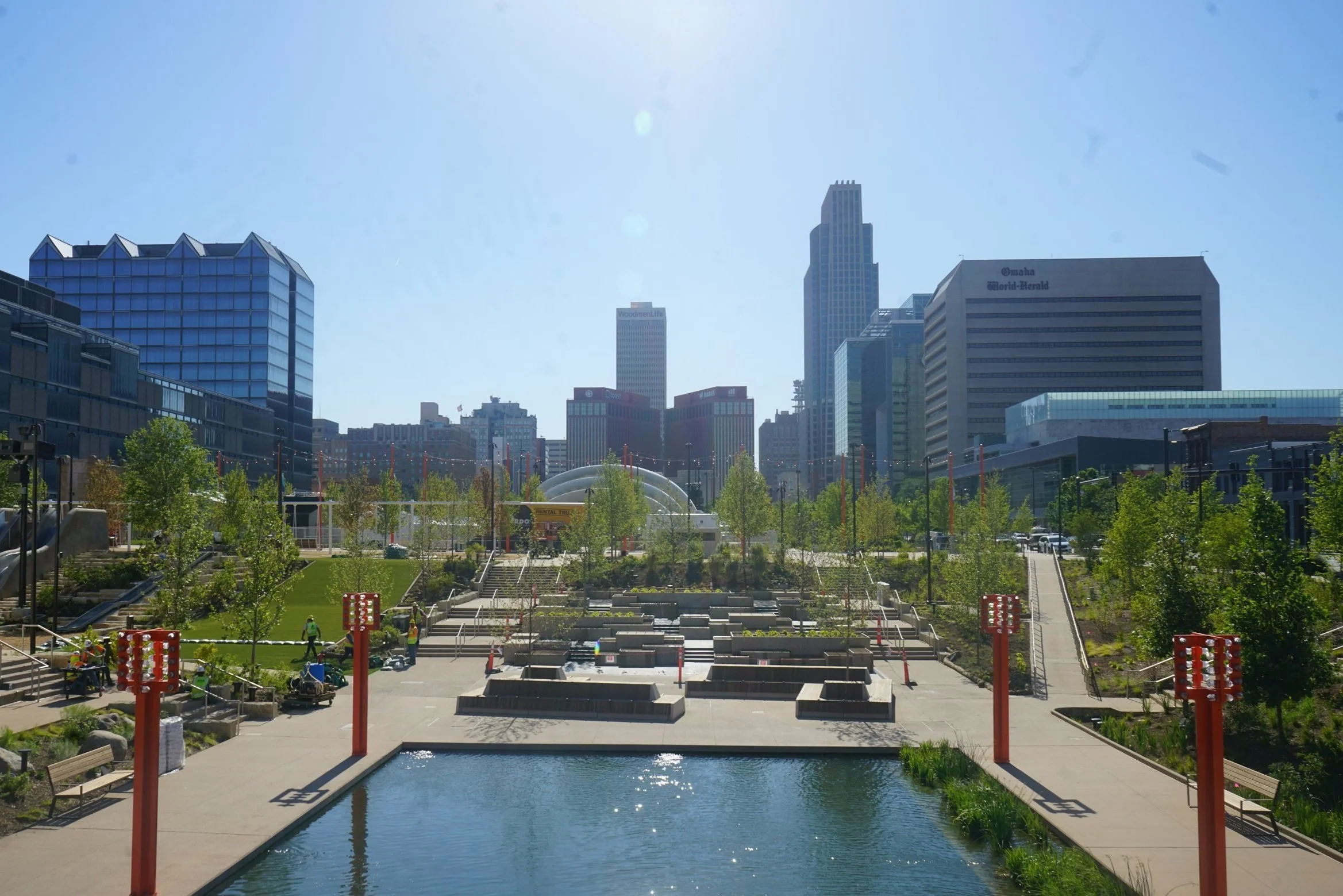Urban Planning for a Better Future for Omaha’s Black Community. A Conversation With Tamika Butler
Tamika Butler speaks at the Metropolitan Area Planning Agency’s Heartland 2050 Summit called “Baby Steps, Giant Leaps.” Photo credit: Odelia Amenyah/ NOISE
By Odelia Amenyah
Tamika L. Butler, CEO and principal of her own consulting firm, a national expert on the built environment, equity, anti-racism, diversity and inclusion, was the keynote speaker at the Metropolitan Area Planning Agency (MAPA) Heartland 2050 Summit called “Baby Steps, Giant Leaps” at the end of June. The Heartland 2050 Summit serves as a vision for the future and raises questions about whether the Omaha-Council Bluffs metro and surrounding rural areas will be a place of opportunity for young talent.
“I decided I want to be a diversity trainer because I want to help people who aren’t people of color realize when they are being racist,” said Butler.
Attendees were able to participate in discussions, networking and action planning to address issues they see, but also to reflect on decisions needed to make sure the future of Nebraska is accessible to all.
“I decided I want to be a diversity trainer because I want to help people who aren’t people of color realize when they are being racist”
The summit featured videos of five families who each have children born in the year 2020 who will be 30 in the year 2050. Parents of these children shared their hopes for their children’s futures and asked questions on whether Nebraska will be a place for their children to grow, learn, and have access to opportunities.
Taking the right steps to ensure that future generations of young Nebraskans will have access to quality education systems, robust transportation, affordable housing, healthcare and professional opportunities was at the forefront of the summit’s conversation.
“Nebraska is experiencing a brain drain,” said MAPA's communication and outreach manager, Karna Loewenstein.
The phrase “brain drain” is defined as the “departure of educated or professional people from one country, economic sector, or field for another, usually for better pay or living conditions.”
In an interview with NOISE Omaha, Butler said that she has always been an organizer. Whether it was organizing a game of tag or even organizing students at Creighton University to push back against the administration.
“Nebraska is experiencing a brain drain.”
“I have never thought of planning as a passion, but as an intrinsic part of who I am,” said Butler.
Butler's roots are in Omaha. Her parents are Omaha natives and many of her family members still reside in Omaha. She noted that her father was in the military and her family had to move around a lot. Once they moved back to Omaha at the start of her freshman year of highschool; the transition was stark.
“I was used to my identity being American, but when I moved back to the United States my identity was about my race and being gay,” she said.
When it was time for Butler to go to law school she felt like Nebraska was not a place for her to fully be herself. Once she left Nebraska it was harder for her to come back because she found more opportunities in L.A.
“Being Black and gay in Nebraska seemed to be hard,” Butler said.
However, she believes that Nebraska is different now compared to when she decided to leave. She wouldn't be surprised if people wanted to stay in Nebraska.
Butler believes that for officials to retain young talent in Nebraska they need to make it clear that Nebraska is an inclusive space for all.
“I think what is tough is that Nebraska has a PR problem. People who are from here love it here and understand ‘The Good Life,’” said Butler. “If you’re a young person and national politics is worrying you because you are a woman, queer, or Black, seeing a world that is giving states more power will make a young person move to a state where they can live without fear.”
“Being Black and gay in Nebraska seemed to be hard.”
When she is consulting or simply having conversations, Butler understands that talking about racism and equity can be overwhelming but she hopes a person walks away thinking there is something they can personally do to change the status quo.
Butler attended Bellevue West High School, graduated from Creighton University with a B.A in Psychology and a B.S. in Sociology, then went on to Stanford Law School. Now, she is a doctoral student in urban planning at UCLA’s Luskin School of Public Affairs.
“I am not a planner because I am well-trained. I am a planner because I am a person that cares about other people, who wants my kids to be able to experience a world that is different from what I experience. I want them to know what it means to be mobile,” she said.
For Butler, being a Black kid who cared about racial equity meant she was always told that she should go into education or criminal justice reform. However, nobody ever told her that she could be an urban planner.
“You should totally be an urban planner if you care about racial justice,” said Butler, “ It's one of the core ways to keep people separate.”
Transportation is intrinsically tied to housing, belonging, and where people can go. As a Black woman, Butler is focused on the experience of Black people in America and how they are able to be mobile in their communities.
“We live in a world where as a Black person I have to be afraid to go to the grocery store. I have to be afraid to walk around my own neighborhood wearing a hoodie and carrying a bag of Skittles in my pocket and I have to be afraid to hang out on the sidewalk with my friends,” Butler said.
She gave an example of an initiative called Vision Zero that has been implemented in Omaha and in many cities across the country. This initiative was adopted by Scandinavian countries with the goal of reducing and preventing traffic deaths and fatalities every year.
In cities that have implemented Vision Zero, the transportation department and law enforcement work together to try to prevent traffic deaths. She raised the question, “Can Vision Zero work in a racist society?”
“You can’t have a policy like Vision Zero if one of the main tenants is enforcement, if you're not willing to acknowledge what enforcement means for people of color in this country,'' Butler said.
“People fail to realize transportation has always been a part of the civil rights struggle,” she said.
“People fail to realize transportation has always been a part of the civil rights struggle.”
But, transportation is not the only thing that has to do with race. The prison system, environmental work and education systems are also about race.
Butler said the book “The Color of Law” by Richard Rothstein, explains redlining and how planners were instrumental in segregating America and making sure the phrase “the other side of the tracks” actually meant something.
“Even in planning we still always find a way to center whiteness. When we talk about history we have to ask ourselves, ‘Whose perspective is this from?’”
Butler recognized that the problem with planning for public spaces is that not everyone will be able to enjoy that space who is not in a white body.
“We want to help. We want to make people safe, but the definition of safe is very different for different people and we have to think about that when we do our work,” Butler said.
She noted that the white people are overrepresented in the professions of engineering and planning. This impacts the services that planners are supposed to provide to the people they serve.
The nonprofit Transit Center wrote a report “Who Rules Transit” that found demographics in the Census show that people who rely on public transportation are low income and people of color, however that is not who works in management at transit agencies.
“How do you work with folks to be connected but don’t have the people you are trying to connect with on the transit board? '' Butler asked.
She said recognizing these issues warrants conversations about race. Ignoring it simply won’t help. Having the courage to have brave conversations, not being afraid to make mistakes, is how we can move forward. Going out into communities helps planners create an equitable system. Asking questions about who is most likely to be impacted is essential in planning spaces.
“Identify who is being impacted. Then look around the table to see who is making decisions. If the table doesn't reflect who is being impacted, then there is a power imbalance,” said Butler.
Butler told attendees at Heartland 2050 that making statements and proclamations is not enough. Planners and community organizers actually have to do the work to challenge policies put in place to separate people.
The real work is asking yourself ‘Why didn’t you notice this before?’” Butler said.
When she thinks about “Baby Steps” and the Omaha metro region, she thinks about what it means to be “Nebraska Nice.”
A large audience listens to Tamika Butler at the Metropolitan Area Planning Agency’s Heartland 2050 Summit, “Baby Steps, Giant Leaps.” Photo credit: Odelia Amenyah/ NOISE
“We are really nice here, but being nice isn’t enough. Being nice is only a baby step, we have to go deeper than that,” she said.
Butler thinks focusing on fault when talking about race is not the way to move forward. Focus needs to be on what is happening, how resources have been distributed, and who is ahead and who is behind.
Butler says the work she does is for her kids, Black people, the LGBTQ+ community, but most of all, for the world she wants to leave behind for future generations.
She told the crowd at Heartland 2050, “As you go on about your day I urge you to think about what your work is and what kind of ancestor you want to be.”
Because today’s kids will inherit the world we are creating now.

